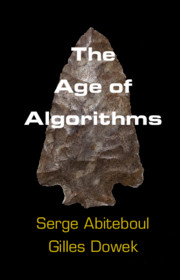
-
Select format
-
- Publisher:
- Cambridge University Press
- Publication date:
- 17 March 2020
- 16 April 2020
- ISBN:
- 9781108614139
- 9781108484572
- 9781108745420
- Dimensions:
- (216 x 140 mm)
- Weight & Pages:
- 0.32kg, 166 Pages
- Dimensions:
- (216 x 140 mm)
- Weight & Pages:
- 0.22kg, 166 Pages
You may already have access via personal or institutional login
Book description
Algorithms are probably the most sophisticated tools that people have had at their disposal since the beginnings of human history. They have transformed science, industry, society. They upset the concepts of work, property, government, private life, even humanity. Going easily from one extreme to the other, we rejoice that they make life easier for us, but fear that they will enslave us. To get beyond this vision of good vs evil, this book takes a new look at our time, the age of algorithms. Creations of the human spirit, algorithms are what we made them. And they will be what we want them to be: it's up to us to choose the world we want to live in.
Reviews
‘... written by two computer scientists offering a most accessible view on both what algorithms are (the book starts with a clearest analogy between algorithms and recipes) and how algorithms are severely changing human life.’
Simona Chiodo Source: Metascience
‘This short and interesting book provides a non-technical introduction to the age of algorithms. The book is worth reading many times even by those unfamiliar with algorithms or computer science.’
S.V. Nagaraj Source: The SIGACT News
Contents
Metrics
Altmetric attention score
Full text views
Full text views help Loading metrics...
Loading metrics...
* Views captured on Cambridge Core between #date#. This data will be updated every 24 hours.
Usage data cannot currently be displayed.
Accessibility standard: Unknown
Why this information is here
This section outlines the accessibility features of this content - including support for screen readers, full keyboard navigation and high-contrast display options. This may not be relevant for you.
Accessibility Information
Accessibility compliance for the PDF of this book is currently unknown and may be updated in the future.


